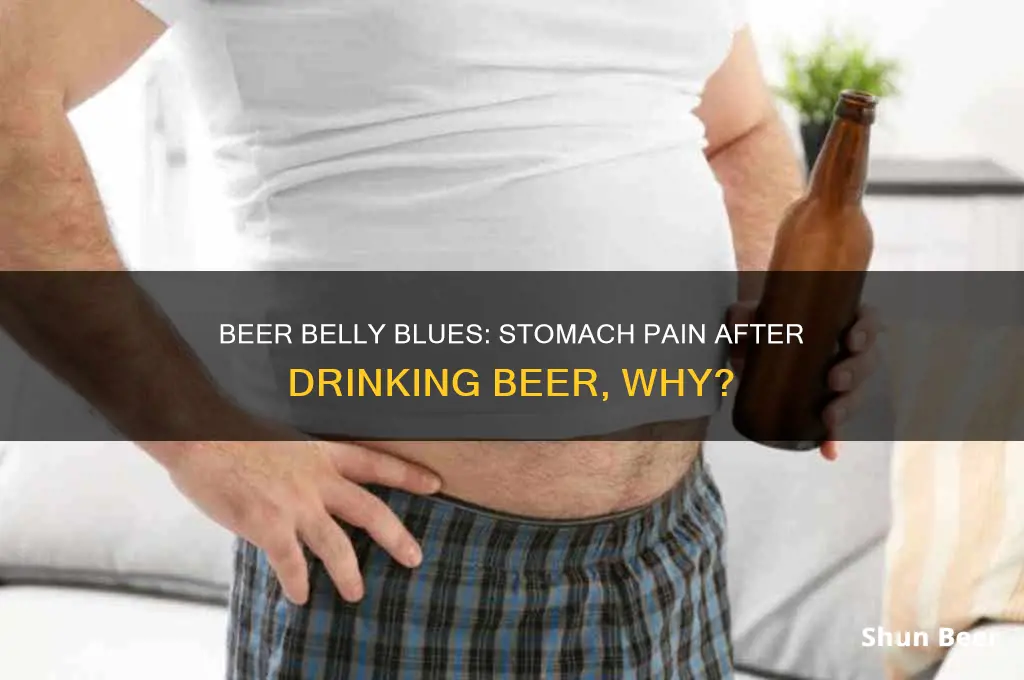
Alcohol can cause stomach pain for a variety of reasons. One of the main reasons is that it increases the amount of acid in the stomach, which can irritate and inflame the stomach lining, a condition known as gastritis. Beer, in particular, can lead to inflammation in the gut and increase the risk of liver disease. It can also cause bloating, discomfort, and an upset stomach, especially in those with a beer allergy or intolerance. Alcohol can also speed up digestion, leading to diarrhea, or slow it down, leading to constipation. Additionally, alcohol can worsen existing stomach problems such as ulcers, and delay their healing.
| Characteristics | Values |
|---|---|
| Stomach Problems | Sickness, vomiting, loss of appetite |
| Gastritis | Inflammation of the stomach lining |
| Cause of Gastritis | Irritation of the stomach lining due to alcohol |
| Symptoms of Gastritis | Pain, sickness, loss of appetite, acid reflux, indigestion, persistent stomach discomfort, pain at meals or during sleep |
| Complications of Untreated Gastritis | Stomach ulcers, anemia, peptic ulcers, gastric polyps, stomach tumors |
| Alcohol's Effect on Digestion | Alcohol speeds up metabolism and can cause diarrhea |
| Beer Intolerance Symptoms | Brain fogginess, fatigue, inflammation, anxiety, bloating, diarrhea, swollen eyes |
What You'll Learn

Alcoholic gastritis
The symptoms of alcoholic gastritis may be mistaken for common gastrointestinal problems like indigestion or acid reflux. These symptoms include:
- Stomach or abdominal pain
- Bloating or a feeling of fullness in the stomach that worsens after eating
- Bleeding in the stomach, which can lead to anemia, resulting in fatigue and shortness of breath
Treatment for alcoholic gastritis involves addressing the underlying cause of alcohol abuse and making dietary changes. Medications such as antibiotics, antacids, proton pump inhibitors, and histamine (H2) blockers may be prescribed to reduce inflammation and treat stomach ulcers and reflux. Patients are advised to avoid spicy and acidic foods, alcohol, smoking, and certain medications.
Untreated alcoholic gastritis can lead to serious complications, including anemia, peptic ulcers, gastric polyps, and stomach tumors that may or may not be cancerous. Therefore, it is important to seek medical help if one experiences symptoms like blood in vomit or feces, dark or tarry feces, extreme weakness, or unexplained weight loss.
Beer and Meclizine: Safe Mix or Health Risk?
You may want to see also

Beer allergy
Beer allergies are rare, but they can develop at any point in life. If you have a beer allergy, you are likely to experience symptoms common to other food allergy symptoms, such as:
- Abdominal pain and bloating
- Diarrhea
- Heartburn
- Tightness of the chest
- Hives
- Wheezing
- Anaphylaxis (a rare but severe reaction)
- Shortness of breath
- Swelling of the throat or tongue
- Loss of consciousness
If you experience any of these symptoms, seek immediate medical attention.
Beer contains many ingredients that may cause an allergy, such as malt barley, brewer's yeast, hops, assorted flavorings, gluten, histamines, sulfites, and wheat. You may be allergic to one of these ingredients and not others, so it is important to get tested to determine your specific allergy.
If you have a beer allergy, the best treatment is avoidance. Stay away from the ingredients you are allergic to and be sure to read labels carefully. With a little research and careful label reading, you may be able to find beers that do not contain the allergen you are allergic to.
It is important to note that a beer allergy is different from a beer intolerance or alcohol intolerance. A beer allergy is an immune response, while an intolerance is a digestive response. Alcohol intolerance is a genetic condition where the body cannot effectively break down alcohol. If you have alcohol intolerance, the only solution is to completely avoid alcohol.
Drinking Beer While Driving in Victoria: What's Allowed?
You may want to see also

Alcohol intolerance
The only way to prevent these uncomfortable reactions is to avoid alcohol or the specific substance that triggers the reaction. In some cases, an individual may be intolerant to certain ingredients in alcoholic beverages, such as chemicals, grains, or preservatives. Combining alcohol with certain medications can also cause reactions.
It is important to distinguish between alcohol intolerance and alcohol allergy. While alcohol intolerance is a digestive system disorder, an alcohol allergy is an immune system response to the ingredients in alcoholic beverages. Allergic reactions to alcohol can cause symptoms similar to alcohol intolerance, such as difficulty breathing, coughing, a runny nose, or stomach upset. These symptoms may be triggered by even a small amount of alcohol and are the result of the body creating antibodies against these allergens.
If you are experiencing any of these symptoms after consuming alcohol and are unsure if you have an alcohol allergy or alcohol intolerance, it is recommended to consult a doctor.
Beer and PEP: A Safe Mix?
You may want to see also

Alcohol increasing stomach acid
Alcohol can cause stomach pain for a variety of reasons. One of the main reasons is that it increases the production of stomach acid. This can lead to acid reflux and indigestion, causing discomfort and pain.
Alcohol is a known contributor to acid reflux because it interacts with the stomach and oesophagus in several ways. Firstly, it stimulates the production of gastric acid, which can be more than the body's usual capacity. Secondly, it can damage the lining of the stomach, causing abrasion and swelling. This damage to the stomach lining can also make the body more sensitive to irritants and food, further intensifying the pain.
The effect of alcohol on gastric acid secretion is dependent on its concentration and the type of alcoholic beverage. Pure ethanol in low concentrations (less than 5% vol/vol) mildly stimulates acid secretion, while at higher concentrations, it has no effect or even inhibits acid secretion. Interestingly, alcoholic drinks with low ethanol content, such as beer and wine, strongly stimulate gastric acid secretion. On the other hand, beverages with higher ethanol content, like whisky, gin, and cognac, do not stimulate acid secretion.
The powerful stimulants of gastric acid secretion in beer are yet to be identified, but they are believed to be thermostable and anionic polar substances. This effect of beer on gastric acid secretion is so strong that it equals the maximal acid output.
Chronic alcohol abuse can also lead to a condition called alcoholic gastritis, where the stomach lining becomes inflamed or worn down. This can further increase sensitivity to irritants and cause persistent stomach pain.
Beer and Workout: A Healthy Mix?
You may want to see also

Alcohol-induced diarrhoea
Agitation and Faster Digestion
Alcohol can irritate and agitate the intestines, causing them to speed up digestion. The muscles in the colon contract more frequently and push stool out faster than usual, resulting in diarrhoea. This is because the intestines do not have sufficient time to properly digest the passing food.
Water Absorption Issues
The large intestine is responsible for pulling liquids out of the stool before passing it out of the body. However, when alcohol is present, the large intestine does not function optimally, leading to liquid stools and dehydration.
Inflammation
Alcohol can cause inflammation in the gastrointestinal tract. It can also lead to increased acid production in the stomach, which, in turn, can increase irritation and inflammation. This irritation is a common trigger for diarrhoea.
Bacterial Imbalance
The intestines contain a variety of bacteria that work to maintain balance by attacking harmful pathogens. Alcohol can disrupt this balance by killing off some beneficial bacteria or allowing harmful ones to grow rapidly, leading to intestinal malfunction and diarrhoea.
Gluten Intolerance
Some alcoholic beverages, such as beer and certain liquors, contain gluten. People with gluten intolerance or sensitivity may experience a reaction to the grains in these drinks, resulting in diarrhoea.
Tannins in Wine
Wine contains tannins, which are compounds found in the skin of grapes. Some individuals may have a sensitivity or allergy to tannins, leading to diarrhoea, in addition to other symptoms such as headaches and nausea.
High Sugar Content
Alcoholic beverages, especially mixed drinks, can be high in sugar. Excess sugar consumption can cause the body to push out the contents of the intestines more quickly, contributing to diarrhoea.
Poor Lifestyle Choices
Binge drinking, drinking on an empty stomach, irregular sleep patterns, and an unhealthy diet can all increase the risk of experiencing alcohol-induced diarrhoea.
Pre-existing Health Conditions
Individuals with pre-existing gastrointestinal or bladder health issues, such as irritable bowel syndrome (IBS), celiac disease, or Crohn's disease, are more likely to experience diarrhoea after consuming alcohol.
It is important to note that alcohol-induced diarrhoea usually resolves within a few days of abstaining from alcohol and adopting self-care measures. However, if the diarrhoea persists or is accompanied by other concerning symptoms, it is recommended to consult a healthcare professional.
Beer and Medication: Safe or Not?
You may want to see also
Frequently asked questions
Beer contains ingredients that can cause an allergic reaction, such as grains, hops, and yeast. Beer is also carbonated, which can cause bloating and discomfort. In addition, alcohol increases acid production in the stomach, which can irritate and inflame the stomach lining, causing gastritis and stomach ulcers.
Symptoms of a beer allergy or intolerance include extreme bloating, discomfort, an upset stomach, fatigue, inflammation, anxiety, diarrhoea, swollen eyes, and a foggy brain.
If you suspect a beer allergy or intolerance, it is best to avoid beer and opt for gluten-free drinks instead. You can also try limiting or avoiding caffeine, staying hydrated, and sticking to bland foods like bananas, crackers, and toast.







